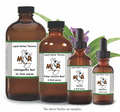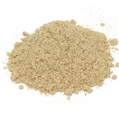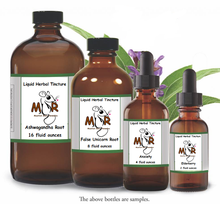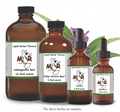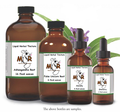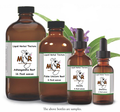 Loading... Please wait...
Loading... Please wait...- Home
- Herbal Tinctures
- Herbal Tinctures - Combination
- Insomnia Herbal Tincture
Insomnia Herbal Tincture
Product Description
Insomnia Herbal Tincture
Sleep is one of the most deeply healing and revitalizing experiences known. When we can get enough restful sleep each night, the entire world looks brighter. Insomnia is a lack of healthful, restful sleep and is a common problem experienced by as many as 20% to 30% of American adults at various times in their lives. Statistics report a fifth of American adults and half of American seniors have difficulty falling asleep on any given night (Reiter and Robinson, 1995). The most prevalent sleeping disorder is chronic insomnia, which is experienced by 15% of adults.
Insomnia can be based on or aggravated by a neurotransmitter imbalance. Neurotransmitters are chemicals that allow nerve impulses to travel from one nerve cell to another, and include serotonin, acetylcholine, GABA, and the sex hormones testosterone and estrogen. Sleep disorders and such symptoms as depression are especially linked with an imbalance in the neurotransmitter serotonin. Serotonin is manufactured by the body from the amino acid tryptophan. Herbs and foods high in tryptophan that help restore proper serotonin levels in the brain are St. John’s wort, quinoa, spirulina, and soy products.
Some Aides to help you sleep better: Maintain a regular sleep schedule. Arise at a specific hour each morning, regardless of the previous night’s sleep to help set your biological clock. To consolidate and deepen sleep, restrict the amount of sleep to only as much as needed to feel refreshed during the following day. Exercising regularly helps deepen sleep; however, strenuous exercise should be completed three-four hours before going to bed. Arrange the bedroom so that it is a comfortable setting. Insulate it against sound and light by using carpets and curtains; ear plugs and eye masks may be helpful.
Keep the room at a cool to moderate temperature. Excessive heat disturbs sleep.
Avoid liquids before going to sleep to minimize nighttime trips to the bathroom. If liquids are not a problem, try drinking a small hot beverage (dairy, rice, or soy milk) at bedtime.
Avoid alcohol, tobacco, and caffeinated beverages (especially in the evening). Note: Although alcohol may help a person fall asleep, it causes subsequent sleep to be fragmented.
As far as possible, work out family or job related problems before going to sleep.
Use the bedroom for sleeping and sexual activity only. If you can’t fall asleep, don’t get angry at yourself; get up, leave the room, and engage in another activity like reading or stretching. Hide the clock if you find yourself waking up to see the time. Avoid napping longer than one-hour or after four pm. Turn off the telephone. Try a relaxation technique, such as, biofeedback, meditation, yoga, progressive muscle relaxation, or massage to prepare the mind and body for sleep.
This herbal tincture contains the following herbs:
Chamomile (Matricaria chamomilla L): Chamomile is a time-honored sedative herb which can be safely used by children and adults alike. Chamomile tea is commonly used in Europe, South America, and Mexico for insomnia and restlessness combined with irritability, particularly in children. Chamomile oil can also be put in bath water (5-6 drops) to soothe overwrought nerves, diluted to 2% to make an excellent massage oil, or used as an inhalant.
Hops (Humulus lupulus): In the early 1900s, Eclectic physicians used hops as a sedative specifically for insomnia due to worry or nerve weakness (Bell, 1925; Ellingwood, 1983). Hops, a major flavoring component of beer, has a long history of use for sleeplessness, nervousness, and restlessness. Hops pillows are sometimes used for mild insomnia.
Lavender (Lavandula Officinalis): Lavender is a gentle strengthening tonic for the nervous system. A few drops of lavender oil added to a bath before bedtime are recommended for persons with sleep disorders. Additionally, the oil may be used as a compress or massage oil or simply inhaled to alleviate insomnia.
Passion Flower (Passiflora Incarnata): Herbalists consider passion flower an important herb for insomnia caused by mental worry, overwork, or nervous exhaustion. In England it is an ingredient in forty different commonly-sold sedative preparations. Passion flower is used for minor sleep problems in both children and adults (Bruneton, 1995). It is an excellent sedative with no side effects even when used in large doses (Spaick, 1978).
Valerian Root (Valeriana Officinalis): In the United States, herbalists use valerian extensively for its sedative action against insomnia, nervousness, and restlessness. It is recommended for those type of people who have a hard time falling asleep, because it shortens sleep latency. It also reduces nighttime waking. Valerian is an excellent herbal sedative that has none of the negative side effects of Valium and other synthetic sedatives. It works well in combination with other sedative herbs, such as California poppy, skullcap, hops, and passion flower.
Kava Kava (Piper Methsticum): Kava is the national drink of Fiji and is popular throughout the South Seas. It imparts a calm feeling, relaxes the body, and sometimes enhances communication and dreaming. This sedative herb is often used for sleeplessness and fatigue.
St. John's Wort (Hypericum Perforatum): This common yellow-flowered weedy herb from Europe is quickly becoming an important part of modern herbal therapeutics. It has a long history of use dating back to ancient Greek times. Modern scientific studies show that it can help relieve chronic insomnia and mild depression when related to certain brain chemistry imbalances. Because this herb can sensitize the skin to sunlight, if you are taking a full dose, avoid direct skin exposure to bright sunlight.
Our tinctures come in a 2 fluid ounce amber glass bottle with black dropper and is safety sealed.
Suggested: Use 6-12 drops in juice or water, under the tongue or as desired. May be taken 3 times daily. Shake well and store in a cool dark place. Keep out of reach of children.
Disclaimer: The information presented herein by Mountain Maus’ Remedies is intended for educational purposes only. These statements have not been evaluated by the FDA and are not intended to diagnose, cure, treat or prevent disease. Individual results may vary, and before using any supplements, it is always advisable to consult with your own health care provider.
Find Similar Products by Category

Product Reviews
-
Really Like this tincture

Posted by Pam Walkins on 29th Oct 2015
This tincture has really helped me with my insomnia. I take it about 30 minutes before I go to bed and it puts me right to sleep and I stay asleep until my alarm goes off at 6 am.
Thank you for a natural herbal fix to my sleepless nights.






